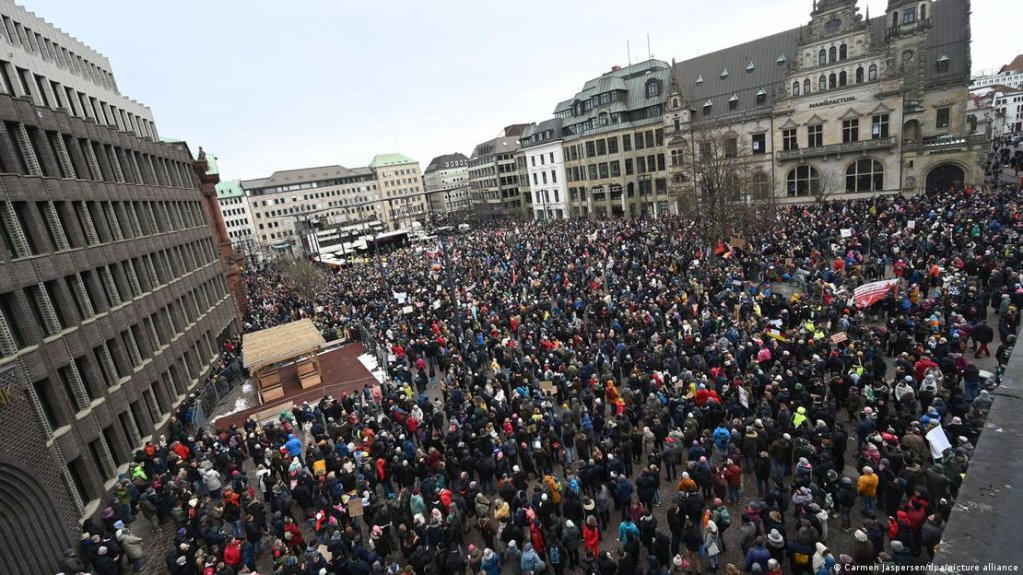Political analysts warn that embedding the term remigration into mainstream political discussions allows its connotations to flow into public discourse and the collective national psyche. In this way, remigration is not limited to stricter immigration policies, but to redefining who belongs in Germany.
The term "remigration" was primarily used in migration studies to describe the voluntary return of migrants and foreigners to their home countries. In recent months, the term "remigration" began emerging in everyday conversation and debate in Germany, carrying a political charge of exclusion. The beginnings of the political leanings of "remigration" became widely known when the investigative news outlet Correctiv exposed a meeting between right-wing extremists and AfD officials in November 2023.
Most recently, remigration gained traction in far-right rhetoric through Alternative for Germany (AfD) leader Alice Weidel who called for "large-scale repatriations" and claimed remigration as a centerpiece of the party’s campaign platform. Remigration was effectively repurposed to push an exclusionary agenda.

Philipp Adorf, an academic scholar at the Institute for Political Science and Sociology at the University of Bonn, traced AfD’s remigration agenda in 2021, and explained that "the term has been in use within nationalist circles for some time." Similar proposals have surfaced in Austria’s Freedom Party (FPÖ) political manifesto, reinforcing the idea that remigration is part of a broader European far-right strategy.
Following Germany’s snap elections which were concluded over the weekend, InfoMigrants spoke to DaMost, an umbrella organization of migrant organizations in East Germany, to better understand the possible impact of a remigration agenda as the center-right Christian Democratic Union takes power and the AfD doubles its voter base.
Is it just stricter implementation of deportation laws?
On their website, the AfD claims that their definition of remigration involves the "legal and constitutional return of foreigners who are required to leave the country" and return to their homeland.
The AfD called for the mass deportation of 250,000 foreigners "required to leave the country", including those with criminal backgrounds. They also called for reviewing and revoking humanitarian residency, calling for citizens of Afghanistan and Syria to return to their countries which they claimed are now safe.
According to DaMost, the approximately 250,000 'persons obliged to leave the country’ who, according to the AfD, are to be deported, are in different legal situations. Many of them have a tolerated stay, which means that although they are obliged to leave the country, they cannot be deported for certain reasons, such as a lack of identity documents or health restrictions.
DaMost explains that their deportation could only be considered "legal" if there are no more obstacles, such as clarifying their identity or an improvement of the situation in their country of origin. DaMost stressed that these people often live in insecure, stressful conditions and that "many would like to improve their living situation if they have the opportunity to do so. It is a complex and humanly challenging process."
'An increase in fear, social division'
Beyond the possible legalization of mass deportation programs, according to DaMost, a broader implementation of "remigration" might include attempts by the AfD to make life more difficult for people with a migration history, such as bureaucratic hurdles, discrimination or pressure to question their identity as ‘non-German’.
DaMost says that such a policy would specifically target people who may feel they are part of society in Germany and pressure them to ‘doubt’ their belonging. "The effects would be dramatic: an increase in fear, plans to emigrate and social division. It is to be expected that this will primarily affect people who are already marginalized. Solidarity with these people is crucial in order to combat this development," DaMost says.
Changes in migration policy will largely depend on who the ruling CDU party will work with within the new coalition government. The AfD having been elected via a 20 percent voter base gives it a significant presence -- it will constitute the strongest opposition group in the new Bundestag. This gives the party certain advantages, such as having the right to respond first to government statements and to open the general debates on the budget. As the second-largest parliamentary group, it is also entitled to a significant amount of speaking time.
Moreover, the AfD and the Left party will hold 216 out of 630 seats in the Bundestag, giving them what is known as a blocking minority (Sperrminorität). This allows them to prevent laws that require a two-thirds majority from being passed. Despite this power, however, the AfD's radical stance and proximity to far-right positions mean it has little trust among the general population, DaMost explained.
Changing views on immigration
Beyond its implications of possibly shaping government policies, political analysts say that the use of "remigration" with its associated meaning of exclusion through the identification of a foreign other, will influence how the collective society perceives immigration. While immigration has always been viewed through the duality of contributing to economic growth, cultural exchange, and enhancement of a labor market, remigration positions immigration as inherently harmful.
The academic scholar Adorf warned that the term is being used to deepen negative perceptions of migrants in public discourse. "The goal is to make people see immigration as a problem rather than an asset," he explained. Over time, this shift could lead to increased pressure on migrants to assimilate completely or face legal and social consequences -- that do not involve necessarily involve deportation. For example, it could also mean making life more difficult for people with migration backgrounds through legal restrictions, job discrimination, and social exclusion. A conflux of factors that could simply make them want to leave.
Embedding remigration into mainstream politics allows its wide interpretations to flow into public discourse and the collective national psyche. In this way, remigration is not limited to stricter immigration policies, but to redefining who belongs in Germany.
Read AlsoHow Germany's election may shape migration in the entire EU
Feeling of insecurity in eastern German states
According to DaMost, the election results in Germany's five eastern states, where right-wing extremist views are particularly widespread, have sparked concern among migrant communities. Many migrants feel increasingly insecure as anti-migration rhetoric has gained ground. In some areas, like Saxony and Thüringen, nearly 40 percent of voters supported the AfD. This shift has created an environment where many migrants, including those who have lived here for years, feel excluded and marginalized, DaMost says.

For some refugees the growing hostility is palpable. "The media and political debates, especially after recent attacks, tend to focus on migrants as problems. This has worsened the situation, making many wonder whether their rights and dignity will continue to be respected," said DaMost.
However, there is also hope, DaMost points out. Migrant groups and activists are finding solidarity in each other and are continuing to fight for equal rights -- and they are not alone. Thousands of citizens took their sentiments to the streets in a wave of protests against the far-right movement ahead of the snap elections. Protests were also fueled by outrage over a proposed law curbing migration proposed by the government and supported by the AfD. The proposed law was rejected by a 350 to 338 vote at the end of January.
"Public protests, such as those against tighter migration policies, show that many people are willing to stand up against these divisive forces," said DaMost.
